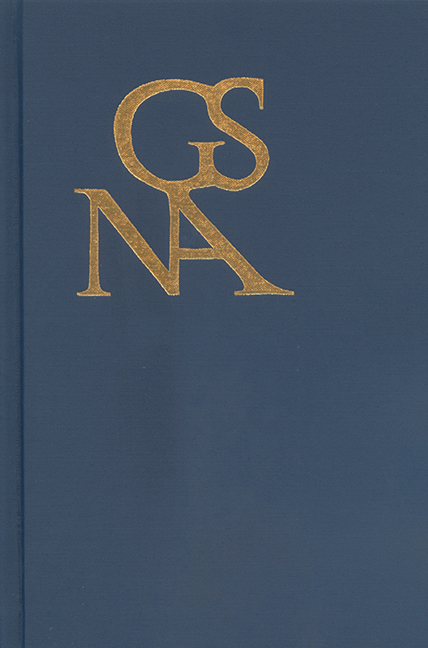Book contents
- Frontmatter
- Contents
- Special Section on Goethe and the Postclassical: Literature, Science, Art, and Philosophy, 1805–1815
- Helena, Then Hell: Faust as Review and Anticipation of Modern Times
- Histrionic Nationality: Implications of the Verse in Faust
- Die Wette in Goethes Faust
- Ecocriticism, the Elements, and the Ascent/Descent into Weather in Goethe's Faust
- Grablegung im Vorhof des Palasts: Groteske Anschaulichkeit in den vorletzten Szenen von Faust II
- Goethes Gnostiker: Fausts vergessener Nihilismus und sein Streben nach Erlösungswissen
- The Unconscious of Nature: Analyzing Disenchantment in Faust I
- Forms of Figuration in Goethe's Faust
- Goethe's Morphology of Knowledge, or the Overgrowth of Nomenclature
- Paraphrasis: Goethe, the Novella, and Forms of Translational Knowledge
- Dramas of Knowledge: The “Fortunate Event” of Recognition
- gegen: Bewegungen durch Goethes “Der Mann von funfzig Jahren”
- “Offenbares Geheimnis” oder “geheime Offenbarung”? Goethes Märchen und die Apokalypse
- Goethe's Green: The “Mixed” Boundary Colors in Zur Farbenlehre
- For Heaven's Sake, I Will Have You Walk into the Dark: Grillparzer's Containment of Beethoven and the Ambivalence of Their Melusina Project
- Imitation, Pleasure, and Aesthetic Education in the Poetics and Comedies of Johann Elias Schlegel
- Feindlich verbündet: Lessing und die Neuen Erweiterungen der Erkenntnis und des Vergnügens
- Juvenalian Satire and the Divided Self in Goethe's “Das Tagebuch”
- Book Reviews
Ecocriticism, the Elements, and the Ascent/Descent into Weather in Goethe's Faust
from Special Section on Goethe and the Postclassical: Literature, Science, Art, and Philosophy, 1805–1815
Published online by Cambridge University Press: 14 March 2018
- Frontmatter
- Contents
- Special Section on Goethe and the Postclassical: Literature, Science, Art, and Philosophy, 1805–1815
- Helena, Then Hell: Faust as Review and Anticipation of Modern Times
- Histrionic Nationality: Implications of the Verse in Faust
- Die Wette in Goethes Faust
- Ecocriticism, the Elements, and the Ascent/Descent into Weather in Goethe's Faust
- Grablegung im Vorhof des Palasts: Groteske Anschaulichkeit in den vorletzten Szenen von Faust II
- Goethes Gnostiker: Fausts vergessener Nihilismus und sein Streben nach Erlösungswissen
- The Unconscious of Nature: Analyzing Disenchantment in Faust I
- Forms of Figuration in Goethe's Faust
- Goethe's Morphology of Knowledge, or the Overgrowth of Nomenclature
- Paraphrasis: Goethe, the Novella, and Forms of Translational Knowledge
- Dramas of Knowledge: The “Fortunate Event” of Recognition
- gegen: Bewegungen durch Goethes “Der Mann von funfzig Jahren”
- “Offenbares Geheimnis” oder “geheime Offenbarung”? Goethes Märchen und die Apokalypse
- Goethe's Green: The “Mixed” Boundary Colors in Zur Farbenlehre
- For Heaven's Sake, I Will Have You Walk into the Dark: Grillparzer's Containment of Beethoven and the Ambivalence of Their Melusina Project
- Imitation, Pleasure, and Aesthetic Education in the Poetics and Comedies of Johann Elias Schlegel
- Feindlich verbündet: Lessing und die Neuen Erweiterungen der Erkenntnis und des Vergnügens
- Juvenalian Satire and the Divided Self in Goethe's “Das Tagebuch”
- Book Reviews
Summary
The ostensibly religious and ethical significance of Faust's final ascension after his death tends to distract, if not blind, readers to other possible implications of that upwards movement and to the idea that he may continue and return “back to earth.” The assumption that heavenly powers reward Faust leads to the claim that Goethe's tragedy validates the quest of “land developers” or those who would strive regardless of the consequences. I propose, in contrast, that we read Faust's “final” ascension alongside Goethe's weather essay, “Witterungslehre 1825,” and thereby note that this upward motion is not necessarily “final” at all but rather part of the circulation of the elements driven by their polarities to create weather patterns flowing upwards and downwards. Goethe describes just such a pattern in his “Gesang der Geister über den Wassern”: “Des Menschen Seele / Gleicht dem Wasser: / Vom Himmel kommt es, / Zum Himmel steigt es, / Und wieder nieder / Zur Erde muß es, / Ewig wechselnd.” Faust's earthly remains travel, in fact, through the same three layers of air, “die Luftregionen” that he describes in the weather essays. And since such flows “zum Himmel,” also come “vom Himmel” as part of inevitable polarities, he shall also likely return “wieder nieder.” When understood within the context of Goethe's science and this poem, the tragedy appears less a final affirmation of Faust's skills as “modern developer” than a portrayal of elemental forces in whose flows we exist. Failure to appreciate and conceptualize their patterns allows us to be swept away all too easily into Mephistophelean land grabs, exploitation of other people and life forms, and the seductive promise of sex, power, and the rapid access to “fire-driven” energy forms. Whether Faust succeeds in diverting the powerful interactions of the four elements and their atmospheric perturbations or rather is swept away in their flows is hence a significant question to ask of the closing scene of Goethe's “final masterpiece.” The answer, typically Goethean, is a little of both.
My efforts here to revisit Faust in terms of Goethe's science, and so to join the work proposed by Astrida Orle Tantillo, also have an eye towards the environmental questions of ecocriticism. The essay has three parts that are each informed by a specific scholar.
- Type
- Chapter
- Information
- Goethe Yearbook 17 , pp. 55 - 72Publisher: Boydell & BrewerPrint publication year: 2010

